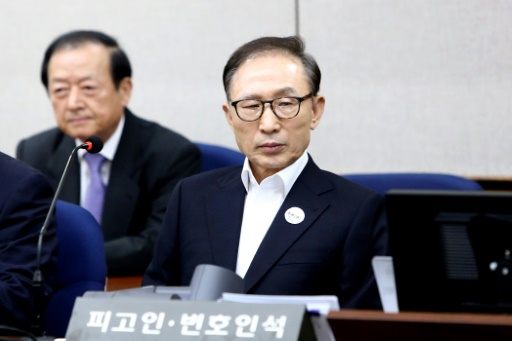South Korea pardons jailed ex-president Lee

Jailed former South Korean President Lee Myung-bak received a presidential pardon on Tuesday, cutting short his 17-year sentence on corruption charges, the justice minister said.
Lee was on a list of more than 1,300 people who received special pardons "from the perspective of broad national unity through reconciliation, tolerance and consideration", Han Dong-hoon told reporters after a Cabinet meeting with President Yoon Suk-yeol.Read More : South Korea says North to face cyber sanctions if it conducts nuclear test The 81-year-old Lee, who in June was granted a temporary release from jail due to his age and deteriorating health, is serving 17 years for bribery and embezzlement.
It was effectively a life sentence as he was not due for release until 2036, when he would be 95.
The former Hyundai CEO-turned-president was charged with 16 criminal allegations in 2018 and sentenced in 2020.
He was found guilty of creating slush funds of tens of millions of dollars and accepting bribes from Samsung Electronics in return for a presidential pardon for its late chairman, Lee Kun-hee, who was jailed for tax evasion.
A self-made man who was appointed head of a major construction firm at age 35 before entering politics, Lee served as president from 2008 to 2013.
He steered the country through the global financial crisis and won its bid for the 2018 Winter Olympics, but was criticized by opponents for undermining the nation's democratic standards and freedoms of speech.
The pardons, effective at midnight on Wednesday, mark the second time Yoon has exercised his clemency power since taking office in May.
In August, Samsung Electronics executive chairman Lee Jae-yong was among the beneficiaries of Yoon's first pardons.
South Korean presidents have frequently ended up in prison after their time in power, usually once their political rivals have moved into the presidential Blue House.
Chun Doo-hwan and Roh Tae-woo, former army generals who served jail terms in the 1990s for corruption and treason after leaving office, received presidential pardons after serving about two years.
Ex-president Roh Moo-hyun killed himself in 2009 after being questioned over graft allegations involving his family.
Lee's conservative successor Park Geun-hye was pardoned last year while she was serving 20 years in jail for bribery and abuse of power after being ousted in 2017 over a corruption scandal that prompted massive street protests.
Lee was on a list of more than 1,300 people who received special pardons "from the perspective of broad national unity through reconciliation, tolerance and consideration", Han Dong-hoon told reporters after a Cabinet meeting with President Yoon Suk-yeol.
It was effectively a life sentence as he was not due for release until 2036, when he would be 95.
The former Hyundai CEO-turned-president was charged with 16 criminal allegations in 2018 and sentenced in 2020.
He was found guilty of creating slush funds of tens of millions of dollars and accepting bribes from Samsung Electronics in return for a presidential pardon for its late chairman, Lee Kun-hee, who was jailed for tax evasion.
A self-made man who was appointed head of a major construction firm at age 35 before entering politics, Lee served as president from 2008 to 2013.
He steered the country through the global financial crisis and won its bid for the 2018 Winter Olympics, but was criticized by opponents for undermining the nation's democratic standards and freedoms of speech.
The pardons, effective at midnight on Wednesday, mark the second time Yoon has exercised his clemency power since taking office in May.
In August, Samsung Electronics executive chairman Lee Jae-yong was among the beneficiaries of Yoon's first pardons.
South Korean presidents have frequently ended up in prison after their time in power, usually once their political rivals have moved into the presidential Blue House.
Chun Doo-hwan and Roh Tae-woo, former army generals who served jail terms in the 1990s for corruption and treason after leaving office, received presidential pardons after serving about two years.
Ex-president Roh Moo-hyun killed himself in 2009 after being questioned over graft allegations involving his family.
Lee's conservative successor Park Geun-hye was pardoned last year while she was serving 20 years in jail for bribery and abuse of power after being ousted in 2017 over a corruption scandal that prompted massive street protests.
Source: japantoday.com
